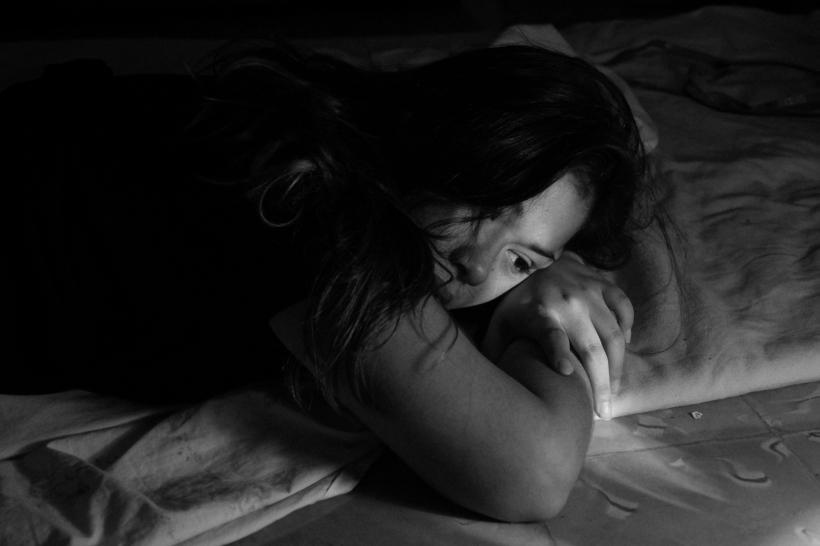
Photo by MMPR on Unsplash
The sick body is at odds with many things—itself, for one, the people who exist around it, and society’s endless demands. Let’s just say that capitalism is a disease that has corrupted the very best of us, instilling in us a sense of forever-shame if we’re not as productive or as valuable or as wealthy as we should be.
Should be.
The idea of ‘should be’ is a body filled with the blood of neverending work.
We should be working, everyone says to everyone else, but that doesn’t mean we always can. And even then, there are different levels of ability.
There are the people who—for whatever chronic health reason—absolutely cannot work. There are people who—despite whatever chronic health issue—do work because they have no other choice. And then there are those who do work, sick and invisible, because they want to, or still can, although it is slowly making them sick. They may feel trapped, but there are no other options.
My parents, both of whom are chronically ill, make up the middle group but should be part of the first. I am the latter.
As chronic illness advocate, model, speaker and writer Charis Hill writes, many disabled and chronically ill people are literally at work fighting for their lives: “For people who struggle every day to get out of bed (or not), manage their health, share an educational post online, and keep a roof over their heads; their most important job is life or death, not paycheck vs poverty. However, many patients in these situations are fighting both for their life and struggling financially. They exist in a life or death and “paycheck” vs poverty continuum.”
So, when you hear about a person with a chronic illness working or not working or considering quitting a job, there is a high likelihood that these decisions were not made lightly, but are fraught with social, financial, and physical implications and risks.
In August, I quit my job for a variety of good reasons, with the most important reason being to salvage my health. I have always been a passionate, detailed go-getter. I started working at 16 because I liked the freedom that it granted me; I grew up poor and later ended up foster care. Money was autonomy and freedom and fun and happiness.
I worked nearly full-time in college, coming home at 2 a.m., and I worked full-time through graduate school. That’s around the time I got sick with a degenerative, inflammatory spinal disease, Ankylosing Spondylitis—although my diagnosis took almost a decade to reach. Today, the disease affects my joints, spine, GI tract, and eyes. It’s also associated with cardiovascular, neurological, and lung-related complications. In short, it is causing new bone formation in my spine. Gross, right?
My passion and need for work continued well into my late twenties when my body still had the stamina to stay up until 3 a.m. staring at a screen or canvassing door to door for a political organization or getting to work at 6 a.m.
Then one day late last year, things changed. I was working for a company in another state—my daily commute was about three hours, minimum. For many, this is the norm. For someone whose spine wants to fuse when I’m immobile, sitting on a cramped bus for 90 minutes twice a day was torturous.
You Might Also Like: She's A Diva: Finding Sexiness In My Chronically Ill Body
Beyond that, it was impossible for me to get to doctor’s appointments back in the state where I lived, so I was continually skipping appointments or physical therapy to accommodate my work. Working from home was not a company-wide option, and what time I did get wasn’t helping to balance the chronic pain, extreme fatigue, brain fog, and general anxiety of constantly either working or commuting. The medicine I was prescribed—biweekly injections—hadn’t worked and I was only getting side effects.
I needed to recalibrate, to find sustainable physical and mental healing, especially since my disease is degenerative. I needed to come back home to myself, to find peace, to get the chance to balance work with self-care.
My body was in a panic and a frenzy for more than a year, and by the end, I knew I needed to leave my job.
For the sake of transparency, I want to make it clear that I have not always had this option. I watch my own parents not have this option. But this time, I did have that privilege. I budgeted for leaving. I had lined up freelance anchor clients to make rent, and I bartered my copywriting services in exchange for things I was paying for, like my gym. What I lost was health insurance and a fair amount of pay. What I gained was everything.
At first, I was immediately was struck with shame and guilt. What had I fucking done? Had I seriously walked away from a well-paying job? I thought about how many people with disabilities and chronic illness need a job or suffer through the labyrinthine chase for disability coverage or make well below liveable wages.
However, I was sick and only getting sicker.
Being chronically ill means adjusting your life to accommodate your sickness.
There’s no telling when your pain will become so big and so loud that you’ll need to sit on the sidewalk and simply cry. There’s no predicting the 3 p.m. fatigue that makes your typical post-lunch slump feel like the energy of a thousand tropical storms. I mean, having a flare-up is like having the flu at all times, except the flu is also punching you out from the inside.
When I decided to quit, I told my chronic illness support group. Every single person told me that they would do the very same—and that they couldn’t imagine commuting three hours, working eight+ more, and having limited access to doctors and therapy appointments. But I wanted to stick through it, I argued! I wanted to work hard and win. I wanted to conquer this disease! I wanted to make money. I wanted to fit in and be considered valuable.
Lisa, you have a disease that will never go away, and the best medicine on the market isn’t working, one of the members told me. Is this the kind of runaround you’d give to anyone else?
That changed me.
More than that, I turned my beliefs inward—toward myself. I’d always maintained that sick people are no less valuable. If anything, they radiate, despite what they have to deal with every single day of their lives. So why was I internalizing all these capitalist messages?
I then told a handful of other people, people without illness. Responses ranged from, “I absolutely understand” to “Oh, wow! Are you sure?” to “I mean, are you really that sick?”
Invisibly, I am, yes. Outwardly, I’m not.
If you see me once a month and I’m lively, you miss the other random days when I’m on bedrest or at physical therapy or struggling to reach for the conditioner in the shower or when I’m at the doctor’s checking my heart for inflammation.
This is the story of so many of us.
Writer Porochista Khakpour writes in her book Sick: A Memoir, “And the deal with so many chronic illnesses is that most people won’t want to believe you. They will tell you that you look great, that it might be in your head only, that it is likely stress, that everything will be okay. None of these are the right things to say to someone whose entire existence is a fairly consistent torture of the body and mind. They say it because they are well-intentioned usually, because they wish you the best, but they also say it because you make them uncomfortable. Your existence is evidence of death, and no one needs to keep seeing that….”
Being able to quit my job was a privilege. Being able to find full-time freelance work is a privilege, and I recognize this. I wish I could share that with everyone else who has to choose between a paycheck and death, especially when that paycheck comes from unsustainable working hours, low salaries, or physically grueling jobs.
I think about why it’s so shameful to make this choice, why there’s an embedded sense of failure, why what the heart, soul, and body need are at direct odds with the demands of being a human being.
I realized, though, that the hardest choice is sometimes the right choice.
Although I was able to transition to working from home, sometimes people have to make major life adjustments to accommodate their own healing. A friend of mine left New York for a more affordable, smaller city. She left friends and a fulfilling social scene. But she gained peace and the ability to thrive. And other people have had to adjust their careers because of sickness—here, here, here, here, and here.
Leaving my job doesn’t mean I can’t work, or won’t work. It means I need to find what works best for me right now.
That said, taking action to help ourselves is crucial, but it’s also on society to provide accommodation, on employers to truly be humane and flexible, and on each one of us to catch ourselves when we judge another. The point is: We should feel empowered to make these choices. We should feel inspired and strengthened by making a difficult decision. And we should work against those sending those messages around value and worth.
I am still grieving the fact that I couldn’t focus on being my best at work and had to instead focus on getting better, but for the first time in a long time, I’m working toward healing, basking in the light of new productivity and happiness, and learning what my personal limits and necessities really are.
With pieces like this, 7 Ways I'm Remembering Self-Care as a Chronically Ill Black Woman, and The Benefits Of Hiring Someone With A Chronic Illness, I know I’m not alone in rethinking the way we explore the intersection of self-care, work, and chronic illness.








